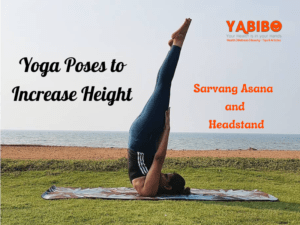Yoga for height increase for a child is something all parents would love to know more about. Yoga to increase height is practiced by many. Growing tall does matter.
Human height is more genetic and also depends upon non-genetic factors such as environmental conditions as well as nutrition.
Yoga is done for holistic well-being since time immemorial. It also increases height. Yoga for height increase for a child can be practiced.
Table of Contents
1. Tadasana
The exercise involves stretching the body muscles from head to toe. This generates posture pressure in all body parts which does facilitate the production of the growth hormone.
Stand erect on the floor with one’s legs, waist, and neck aligned in a straight line. Keep both the feet together, hands on the sides and palm facing the thighs.
While inhaling, raise both of the arms together in the upward direction, parallel to each other.
Slowly lift the heels and stand on the toes. Stretch the body upward as far as possible. Keep the legs and arms straight.
2. Vriksh Asana
The tree pose helps increase height. When the leg is folded and placed over the other thigh, the entire weight is taken by the second leg. This does help in strengthening one’s muscles. Further, when the neck is flexed upwards, the pituitary gland (responsible for producing the growth hormone) does get activated.
Stand with feet together on the floor. Keep the hands at the side and breathe normally.
Stand up firmly on the left leg and fold the right leg at one’s knees. Bring the sole of the right foot on the inner thighs.
Balance on the left foot and raise both arms over the head, elbows unbent, and join the palms together.
Hold this posture with the entire body stretched for a few seconds while breathing gently. Repeat the procedure with the opposite leg.
3. Sarvang Asana and Headstand
Together referred to as Shirshasana, both the poses do involve inversion against gravity. This exerts direct pressure on the pituitary gland.
Lie flat on the back in Shavasana with one’s palms facing downward.
Slowly lift the legs, buttock, and back so that one comes up high on the shoulders, support the back with hands.
Keep straightening the legs as well as the spine. The weight should be supported on one’s shoulders and upper arms.
If any strain is felt in the neck come out of the posture. Stay in the posture for 15 to 30 seconds.

4. Ustra Asana
This is also referred to as Camel Pose. It involves the backward bending of one’s neck which triggers the master (pituitary) gland. People who suffer from fluctuating blood pressure or who have back injuries need to avoid this pose.
Sit in vajrasana (kneel on the Yoga mat). Stand on the knees while inhaling. Draw in the tail bone towards the pub, as if being pulled from the navel.
Keep the back arched and arms straight, sliding the palms over one’s feet.
Stay in this posture for a few seconds, breathing normally.
Breathe out and slowly come back to the initial pose.
5. Paschimotan Asana
This pose exerts pressure on the back thigh muscles and the neck region. This particular asana should not be done by people suffering from slip disc or sciatica.
Sit on the ground and stretch the legs like a stick.
While exhaling, bend forward and hold the toes with one’s hand.
Keeping the back straight, try to rest the head on one’s knees.
Avoid bending the knees and keep your breathing normally.
6. Ujjayi Pranayama
Rightly referred to as the victorious breath, breathing the right way does send direct vibrations to the concerned gland and also help bring positive changes to one’s physical ecosystem.
Find a comfortable sitting or lying position.
Listen to the latest songs.
Make sure that you are breathing in and out through the nose while keeping the mouth shut.
The inhalations and exhalations need to belong and deep.
Conclusion
It is accepted that yoga to increase height is practiced by many. Yoga for height increase for a child is appreciated by parents who are keen that their child should grow tall.

